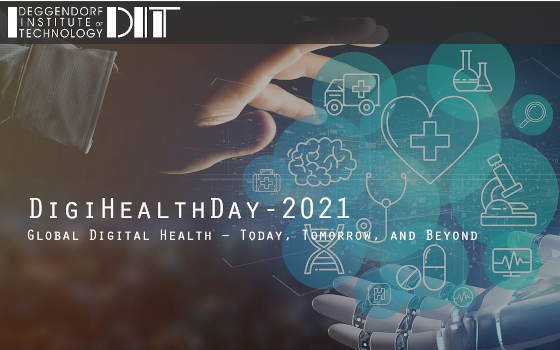This year, one of the key Digital Health events in Germany, ‘Munich Digital Healthcare Summit’ is partnering with DigiHealthDay and DIT-ECRI to beging a milestone partnership of future collaborative international event series in the region.
DigiHealthDay-2021 on Nov 12, begin with the welcome address by honorary Klaus Holetschek - Minister of State for Health and Care, honorary Bernd Sibler - Minister of State for Science and the Arts (Bayern), and other dignitaries; followed by keynotes, parallel sessions, impulse talks, and a panel discussion.
Distinguished experts at DigiHealthDay-2021 include Prof. Slyvia Thun, Prof. Rajendra Gupta, Prof. Brian Dixon, Dr. med. Filippo Martino, Ms. Tatyana Kanzaveli, Dr. Najeeb Al-Shorbaji, and Dr. Nathan Lea. The main highlight event of the year is the panel discussion "The Future of Digital Health Data: Achieving the Opportunities, Addressing the Anxieties, Responding to Risks" with panelist: Dr. Georg Muenzenrieder, PD Dr. med. Dominik Pförringer, Ms. Tatyana Kanzaveli, and Mr. Artur Olesch. The host for the discussion is Prof. Dipak Kalra.
Scientific Session, EFMI Session, Student Session, and CONEDIG session are hosted parallel. Speaking at the EFMI Session are Dr. Lars Lindsköld, Prof. Tomas Lindroth, Dr. Roberta Gazzarata, Prof. Mauro Giacomini, and Dr. Valentina Lichtner. In the Scientific Sessions, selected academic papers in Digital Health will be presented. The Students Session is the stage for recognizing sprouting talents. At CONEDIG Session, The Consortium of Educational Institutions in Digital Health (CONEDIG) will converse on educational reforms, goals, and challenges in Digital Health.
To know more about the future of healthcare, join DigiHealthDay@DIT-ECRI 2021 and many leading international experts from Germany, United Kingdom, United States, India, Hungary, Poland, Sweden, Italy and other countries.
For further information and to register, please visit:
https://www.th-deg.de/digihealthday
Everyone available to present and to join onsite to DIT-European Campus Rottal-Inn IN-PERSON is welcome. The following is applicable: the 3G rule (vaccinated, recovered, or tested) to be checked at the entrance, wearing FFP2 mask in the rooms if the minimum distance cannot be maintained. (*Subject to change at short notice depending on the official regulation).
